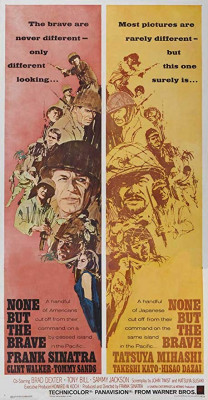| Reviews & Columns |
|
Reviews DVD TV on DVD Blu-ray 4K UHD International DVDs In Theaters Reviews by Studio Video Games Features Collector Series DVDs Easter Egg Database Interviews DVD Talk Radio Feature Articles Columns Anime Talk DVD Savant Horror DVDs The M.O.D. Squad Art House HD Talk Silent DVD
|
DVD Talk Forum |
|
|
| Resources |
|
DVD Price Search Customer Service #'s RCE Info Links |
|
Columns
|
|
|
None But the Brave
Like Hell in the Pacific and the later Tora! Tora! Tora!, the movie dramatizes both the Japanese and American side of things more or less equally, drawing many parallels; even the Warner Bros. logo and main title are bilingual. Lt. Kuroki (Tatsuya Mihashi) leads a platoon of 16 soldiers already stranded on the island for some time. They've improvised a base camp and have been building a sailboat enabling them to leave and it's just about finished when an American C-47/R4D transport plane is shot down, crash-landing on the other side of the island.
The pilot, Marine Aircraft Wing Capt. Dennis Bourke (Clint Walker), assumes command of the survivors, 17 greenhorn Marines led by 2nd Lt. Blair (Sands), and functioning alcoholic Chief Pharmacist mate Francis (Sinatra), tasked with caring for the wounded, despite his limited experience.
Tensions build and men die as the arch-enemies fight over spring water and control of the nearly-ready boat. Both Kuroki and Bourke, recognizing the pointlessness of fighting and dying when both parties are effectively out of action, agree to a truce, at least until one side or the other is able to get back into the war. But can it last?
The film was a co-production of Japan's Toho Co., Ltd. and Tokyo Eiga Co., Ltd. (more or less a Toho subsidiary), and Sinatra's Artanis Productions. It appears to be the first full-fledged U.S.-Japanese co-production, though a number of Hollywood movies were shot in Japan before that, usually with support from Japanese studios, and a few Japanese productions had money and input from predetermined American distributors while they were in production.
Toho/Tokyo Eiga provided contract players such as Tatsuya Mihashi, one of Toho's biggest stars of the time, and Takeshi Kato (playing the more militant second-incommand), a respected stage actor with similarly impressive film credits. Both, for instance, appear in Akira Kurosawa's The Bad Sleep Well (1960) and High and Low (1963). (Kuroki, when speaking English, is dubbed by another, uncredited actor, possibly Mako.) Other Toho talent like Kenji Sahara, Toru Ibuki, and Susumu Kurobe, well-known for their work in Japanese monster movies, play other soldiers, but they're more like spear-carriers, with minor roles. Hisao Dazai, who plays the fat, comical Buddhist monk, would later play the ever-exasperated print-shop owner in the 48-movie "Tora-san" film series.
Further, the film's special effects were directed by Eiji Tsuburaya, the mastermind behind Toho's sci-fi and war movie spectaculars, while Katsuya Susaki, who'd written many of the studio's big war films, worked on the Japanese half of the script, which does resemble Toho's other ‘60s genre titles in many respects.
Dramatically, the script is mainly interested in the parallel commanding styles of Bourke and Kuroki, rather than Sinatra's medic. One suspects the role of Bourke was written for Sinatra rather than Clint Walker, but that ol' Blue Eyes liked the other part better. None But the Brave is Sinatra's only credit as director, and the smaller part no doubt made directing a lot easier, since his character is only onscreen less than one-third of the movie's running time, this despite his top billing. Nevertheless he's quite good, wonderfully playing a key scene where, alone, he's escorted into the enemy camp to amputate a Japanese soldier's gangrenous leg. He, of course, has never performed surgery of any kind, and is terrified thinking about the million things that could go wrong. It's a compelling sequence.
Clint Walker, too, does a fine job projecting a confident, low-key commanding style that gradually earns the respect of the tough-talking Marines. Pop singer Tommy Sands was married to Frank's daughter Nancy at the time, though they'd divorce before the movie came out. His strident, gung-ho Marine is the worst thing about the picture, less believable though no less ridiculous than Frank Burns on TV's M*A*S*H. The other characters on the American side are genre stereotypes, though other than Sands less broadly so than many another movie from the period (e.g., The Green Berets).
Video & Audio
Warner Archive's Blu-ray of None But the Brave, filmed in Panavision, looks great, with strong color and resolution, while DTS-HD Master Audio (2.0 mono) is also reasonably good. However, for all of the Japanese dialogue, subtitled into English, Warner's home video division made the terrible decision to render EVERYTHING IN ALL CAPS, WHICH IS VERY HARD ON THE EYES WHEN THE DIALOGUE GETS WORDY LIKE THIS. The disc itself is Region-Free disc.
Extra Features
The lone extra is a 1.85:1 widescreen trailer, partly done as a behind-the-scenes chat with Sinatra after supposedly finishing a take involving Walker and Mihashi.
Parting Thoughts
Though far from perfect, None But the Brave is sincere and well-intentioned, and Sinatra clearly is trying harder here than in most of his ‘60s films (other than The Manchurian Candidate). Tommy Sands is as grating on the ears as those subtitles are on the eyes, put despite its war movie clichés the movie plays surprisingly well. Highly Recommended.
Stuart Galbraith IV is the Kyoto-based film historian currently restoring a 200-year-old Japanese farmhouse.
|
| Popular Reviews |
| Sponsored Links |
|
|
| Sponsored Links |
|
|
| Release List | Reviews | Shop | Newsletter | Forum | DVD Giveaways | Blu-Ray | Advertise |
|
Copyright 2024 DVDTalk.com All Rights Reserved. Legal Info, Privacy Policy, Terms of Use,
Manage Preferences,
Your Privacy Choices | |||||||
















